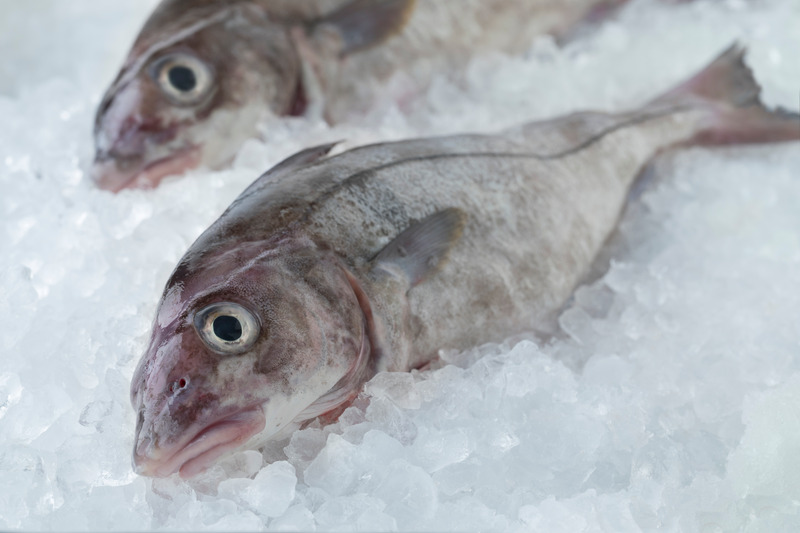Haddock: nutrition facts & data
|
Nutrition facts per 100g |
Haddock |
avg Fish[1]
|
|---|---|---|
| Calories (kcal) | 77.0 | 118.6 |
| Fat (g) | 1.0 | 5.2 |
| Protein (g) | 18.0 | 18.0 |
| Carbohydrates (g) | 0.0 | 0.0 |
| Mono- & Di-Saccharides (g) | 0.0 | 0.0 |
| Polysaccharides (g) | 0.0 | 0.0 |
| Fibers (g) | 0.0 | 0.0 |
| Sodium (mg) | 115.0 | 74.5 |
| Water (g) | 80.0 | 74.8 |
Breakdown in percent (%) of total calories
An average portion size (150g) of Haddock contains:
- 115.5 Calories
- 1.5g of Fat
- 27.0g of Protein
- No Carbs
- 172.5mg of sodium - 0.1% of the RDA for sodium.
- 37.5mg of Magnesium, that covers 0.1% of the recommended daily allowance (RDA) for Magnesium.
- 0.5mg of Zinc - 0.0% of the RDA for Zinc.
- 0.9mg of Iron - 0.1% of the RDA for Iron.
- 450.0mg of Potassium - 0.1% of the RDA for Potassium.
- 3.0mg of Vitamin C - 0.0% of the RDA for Vitamin C.
- 1.1mg of Vitamin B12 - 0.3% of the RDA for Vitamin B12.
Nutrient distribution per gram
What vitamins are in Haddock?
|
Vitamins per 100g |
Haddock |
avg[1]
|
|---|---|---|
| Vitamin C (mg) | 2.0 | 1.0 |
| Vitamin E (mg) | 0.4 | 1.1 |
| Vitamin B1 / Thiamine (mg) | 0.1 | 0.1 |
| Vitamin B2 (mg) | 0.2 | 0.1 |
| Vitamin B6 (mg) | 0.3 | 0.3 |
| Vitamin B9 / Folate (μg) | 9.0 | 10.1 |
| Vitamin B12 (μg) | 0.7 | 2.2 |
| Retinol (μg) | 15.0 | 65.5 |
| beta-Carotene (μg) | 0.0 |
Is Haddock rich in vitamins?
The following chart displays the amount of vitamins per portion Size (150g) for Haddock of the recommended daily allowance (RDA[1]) for each vitamin in percent.
Learn more about RDA values for vitamins by clicking on the names in the table above.
Minerals in Haddock
|
Minerals per 100g |
Haddock |
avg[1]
|
|---|---|---|
| Magnesium (mg) | 25.0 | 31.9 |
| Zinc (mg) | 0.3 | 0.6 |
| Sodium (mg) | 115.0 | 74.5 |
| Calcium (mg) | 20.0 | 32.3 |
| Iron (mg) | 0.6 | 0.8 |
| Potassium (mg) | 300.0 | 330.8 |
| Phosphorus (mg) | 180.0 | 220.4 |
Is Haddock high in minerals?
Again, for every mineral contained in Haddock we looked at the portion size (150g) and applied it to the recommended daily allowance (RDA[1]). Data is shown in percent of RDA per portion size.
Learn more about RDA values for minerals by clicking on the names in the table above.
Carbohydrates in Haddock
0.0% of Haddock are carbs, per serving of 150g that makes 0.0g of carbs.
Monosachharides and polysaccharides
|
Sugars per 100g |
Haddock |
avg[1]
|
|---|---|---|
| Monosaccharides (g) | 0.0 | 0.0 |
| Polysaccharides (g) | 0.0 | 0.0 |
| Total carbs (g) | 0.0 | 0.0 |
How high are the Glycemic Index and the Glycemic Load for Haddock?
The Glycemic Index of Haddock is 0, which would be considered as low. The Glycemic Load in a normal serving is 0.0 and can be regarded as low.
Allergens in Haddock
- is Gluten free
- has no Lactose
- no Fructose
Fatty acids and cholesterol in Haddock
Of the 1.0g total fat per 100g in Haddock, 0.1g are saturated fatty acids (SFA), 0.3g are monounsaturated fatty acids (MUFA) and 0.1g are polyunsaturated fatty acids (PUFA). The amount of cholesterol is 35.0mg.

